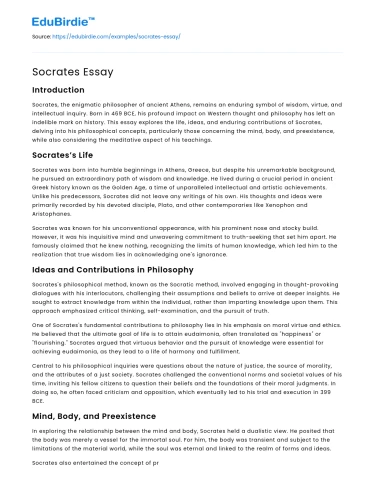Introduction
Socrates, the enigmatic philosopher of ancient Athens, remains an enduring symbol of wisdom, virtue, and intellectual inquiry. Born in 469 BCE, his profound impact on Western thought and philosophy has left an indelible mark on history. This essay explores the life, ideas, and enduring contributions of Socrates, delving into his philosophical concepts, particularly those concerning the mind, body, and preexistence, while also considering the meditative aspect of his teachings.
Socrates’s Life
Socrates was born into humble beginnings in Athens, Greece, but despite his unremarkable background, he pursued an extraordinary path of wisdom and knowledge. He lived during a crucial period in ancient Greek history known as the Golden Age, a time of unparalleled intellectual and artistic achievements. Unlike his predecessors, Socrates did not leave any writings of his own. His thoughts and ideas were primarily recorded by his devoted disciple, Plato, and other contemporaries like Xenophon and Aristophanes.
Save your time!
We can take care of your essay
- Proper editing and formatting
- Free revision, title page, and bibliography
- Flexible prices and money-back guarantee
Socrates was known for his unconventional appearance, with his prominent nose and stocky build. However, it was his inquisitive mind and unwavering commitment to truth-seeking that set him apart. He famously claimed that he knew nothing, recognizing the limits of human knowledge, which led him to the realization that true wisdom lies in acknowledging one's ignorance.
Ideas and Contributions in Philosophy
Socrates's philosophical method, known as the Socratic method, involved engaging in thought-provoking dialogues with his interlocutors, challenging their assumptions and beliefs to arrive at deeper insights. He sought to extract knowledge from within the individual, rather than imparting knowledge upon them. This approach emphasized critical thinking, self-examination, and the pursuit of truth.
One of Socrates's fundamental contributions to philosophy lies in his emphasis on moral virtue and ethics. He believed that the ultimate goal of life is to attain eudaimonia, often translated as "happiness" or "flourishing." Socrates argued that virtuous behavior and the pursuit of knowledge were essential for achieving eudaimonia, as they lead to a life of harmony and fulfillment.
Central to his philosophical inquiries were questions about the nature of justice, the source of morality, and the attributes of a just society. Socrates challenged the conventional norms and societal values of his time, inviting his fellow citizens to question their beliefs and the foundations of their moral judgments. In doing so, he often faced criticism and opposition, which eventually led to his trial and execution in 399 BCE.
Mind, Body, and Preexistence
In exploring the relationship between the mind and body, Socrates held a dualistic view. He posited that the body was merely a vessel for the immortal soul. For him, the body was transient and subject to the limitations of the material world, while the soul was eternal and linked to the realm of forms and ideas.
Socrates also entertained the concept of preexistence, suggesting that the soul existed before its incarnation in the physical body and would continue to exist after death. This idea aligned with his belief in the immortality of the soul. He theorized that the soul's knowledge from previous lives could be recollected through rigorous introspection and philosophical inquiry, a notion later explored by Plato in his theory of anamnesis.
The Socratic method, through which he encouraged self-reflection, played a significant role in investigating the nature of the soul. By engaging in dialectic discussions, he sought to discern the essence of human existence and the nature of the soul's connection to the divine.
Meditations
Socrates pushed for constant self-examination and introspection in his intellectual journey. He regarded philosophy as a way of life, not just an academic exercise—a contemplative path toward self-awareness and self-improvement. Individuals can aim for moral perfection and positively contribute to society by reflecting on their behaviors and beliefs.
Socratic meditations entailed studying characteristics like as courage, justice, knowledge, and temperance in order to cultivate one's character. He felt that through honestly examining our ideas and actions, we may discover our actual selves and connect our lives with greater truths.
Conclusion
Socrates, the luminary of ancient philosophy, continues to inspire seekers of wisdom and truth across the ages. His commitment to intellectual humility, his revolutionary philosophical approach, and his emphasis on the pursuit of virtue have left an enduring legacy. By encouraging self-examination and fostering a meditative attitude, Socrates provided a profound model for personal growth and the advancement of society.
Socrates, the seeker of wisdom and embodiment of virtue, left an unparalleled legacy in the annals of history. His commitment to the pursuit of truth, the encouragement of self-examination, and the value he placed on moral virtue have endured through the centuries. By fostering a meditative attitude and embracing intellectual humility, Socrates not only enriched the world of ancient Greece but also laid the foundation for the development of Western philosophy.
His teachings on the relationship between the mind, body, and preexistence, as well as the enduring impact of his Socratic method, continue to influence philosophical thought, education, and personal development. Socrates's relentless pursuit of knowledge and wisdom serves as an eternal reminder that true enlightenment lies not in having all the answers, but in the willingness to question and explore the depths of existence. As we navigate the complexities of the modern world, we can draw inspiration from Socrates's example and strive to lead lives of virtue, wisdom, and profound self-awareness.






 Stuck on your essay?
Stuck on your essay?

